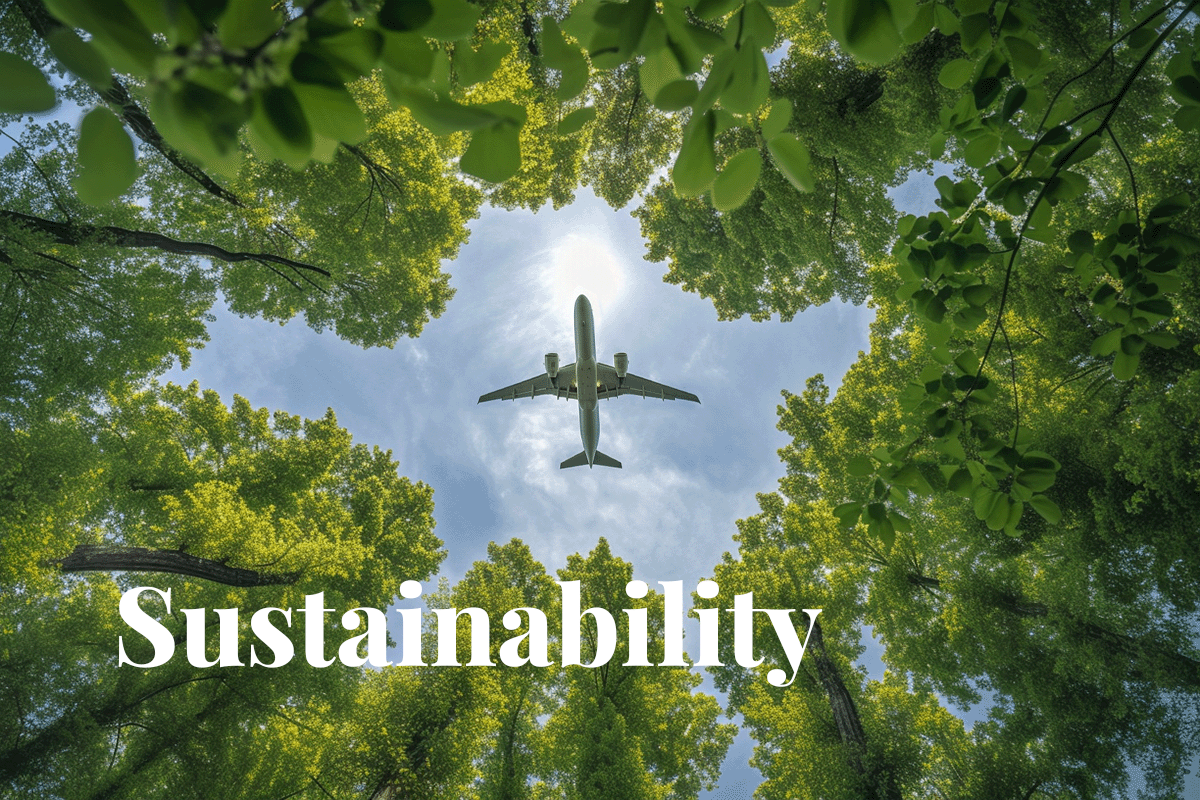The aviation sector's journey towards sustainability marked a significant milestone at the Airline Economics Sustainable Aviation Fuel and Carbon Finance Day, a premier gathering for global aviation professionals. The event, spearheaded by the Airline Economics Group, aimed to bridge the connection between the pioneers of sustainable aviation fuel (SAF) and carbon finance.
 View from below of a plane flying between crowns of deciduous trees.
View from below of a plane flying between crowns of deciduous trees.
Featuring DGB Group’s Director of Operations, Thomas Donia, the panel discussion titled ‘Anatomy of a Carbon Project’ shone a spotlight on the intricacies of carbon projects. Donia, along with other experts like Ben Gatley from Climate Impact Partners and Seb Cross from BeZero Carbon, delved into discussions moderated by Edit Kiss of Integrity Global Partners, showcasing the collaborative spirit driving the industry forward.
Thomas Donia shared insights from the conference, noting his representation of DGB at this significant event, where the focus was on the industry's substantial demand for carbon compensation for hard-to-abate emissions. Donia highlighted the main takeaway from the discussion: DGB is uniquely positioned to meet the aviation industry's needs for high-quality carbon offsets. By participating alongside other industry partners, Thomas emphasised DGB's standing as one of the few project developers with the capacity and expertise to supply the necessary products for sustainable aviation efforts. This underscores DGB's strategic importance in facilitating the aviation industry's transition towards sustainability.
You can follow the highlights of the discussion below:
Question 1 - What can we do to get more projects through due diligence?
Question 2 - How can you do cookstoves with high integrity?
Question 3 - How do you ensure permanence in the project implementation?
You can follow the full panel discussion here
The focus of the event was on sustainable aviation fuels and carbon finance mechanisms—both vital in reducing the aviation industry's carbon footprint. SAF, derived from renewable sources, offers a greener alternative to conventional jet fuels, while carbon finance mechanisms play a crucial role in supporting emissions reduction initiatives.
Key discussions revolved around the advancement of SAF technologies, regulatory frameworks, and the economic and environmental impacts of these sustainable initiatives. The event underscored the importance of collective efforts in accelerating the aviation sector's transition towards a more sustainable and eco-conscious future, highlighting the latest trends, challenges, and opportunities in the field.
A significant challenge was brought to light regarding the aviation sector's preparedness for the UN's Carbon Offsetting and Reduction Scheme for International Aviation (CORSIA) decarbonisation programme's first official compliance phase. The International Air Transport Association estimates that global airlines will need to purchase between 64 million and 164 million carbon credits for the 2024–2026 phase to meet compliance by early 2028. However, the sector faces obstacles in acquiring eligible offsets due to stringent requirements.
Read more: The rising demand for nature-based credits
This discussion underscores the urgent need for clarity on eligible credits and the acceleration of project development to meet the massive compliance requirements. The aviation market's reliance on offsets, due to challenges in scaling up SAF supply and shortages of fuel-efficient aircraft, intensifies the pressure to secure these credits timely. The discourse at the conference highlighted the importance of active participation in CORSIA and the strategic balancing act between managing risk and securing credits at favourable prices.
In the complex world of carbon markets, DGB stands out as a pivotal force, dedicated to clarifying this complex field for all stakeholders. Our core mission involves implementing impactful nature-based projects that not only aim to mitigate carbon emissions but also address a range of social and environmental challenges. As pioneers in managing extensive, high-quality projects verified by leading verification standards, DGB elevates the standard for environmental stewardship. We place a strong emphasis on preserving natural habitats and promoting biodiversity.
Reflecting on Thomas Donia's insights from the Airline Economics Sustainable Aviation Fuel and Carbon Finance Day, it's clear that DGB is strategically positioned to supply the aviation industry with the essential carbon offset solutions it urgently needs. Our capacity to develop large-scale projects and provide top-quality carbon units (carbon credits) aligns perfectly with the aviation sector's requirements, particularly in navigating the complexities of the CORSIA programme and its demand for high-integrity carbon offsets. DGB is not just ready but eager to support the aviation industry in overcoming its emission challenges, marking a significant step forward in achieving a sustainable future.
Partner with DGB for your sustainable journey



